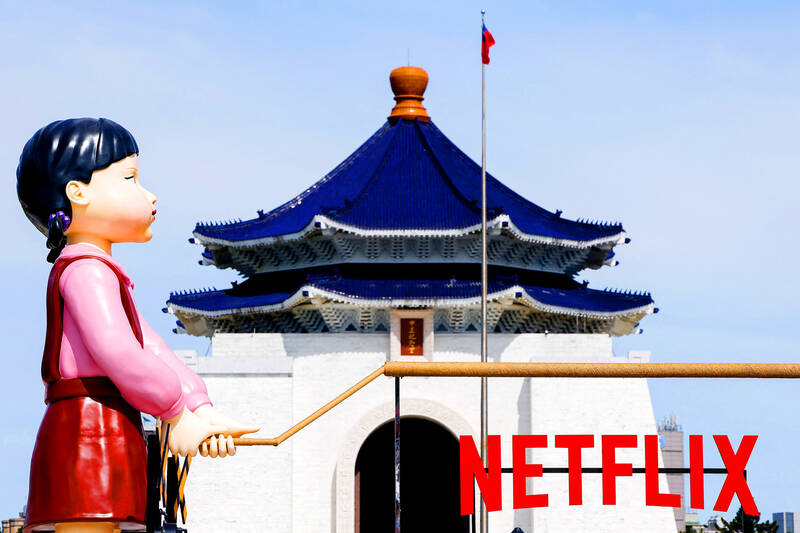Video streaming giant Netflix is launching a talent cultivation program in Taiwan aimed at producing high-quality Mandarin content, the company announced in a press release on Thursday.
Netflix Chinese language content head Maya Huang (黃怡玫) said that Netflix has long invested in the Taiwanese market, citing the Netflix Fund for Creative Equity launched last year as an example.
The fund would continue to dedicate resources to discovering content with the potential to be developed into Chinese-language projects, she added.

Photo: Ann Wang, Reuters
The financing for the new talent projects seeks to create an ecosystem for content creators and professional development programs, she said.
The talent projects feature a training program focused on practical script development, Huang said, adding that the five-month intensive scriptwriting program would be codeveloped with local production company Yiyi Pictures (壹壹影業), with the intention of cultivating scriptwriter assistants.
Trainees would be taught to work in a writers’ room, which is common in the television industry in the West, and learn scriptwriting, pitching and about the content production industry, she said.
Those who are interested can sign up on the Netflix Web site until July 24 at midnight.
The course is to run from Sept. 15 until Feb. 13 next year.
Netflix would also work with the Film and Television Production Association (台灣影視製片協會) as part of the program to train film and television production trainees, Huang said.
In addition to learning how to work within the confines of Netflix’s culture, production trainees would also get a chance to apprentice in actual productions to gain practical experience, she said.
Those who are interested can sign up for the program from yesterday until July 13 midnight.
Although it is only a two-day course (July 24 and 25), the duration of internships with film crews would depend on the availability of partner crews and their projects, Netflix said.

NO BREAKTHROUGH? More substantial ‘deliverables,’ such as tariff reductions, would likely be saved for a meeting between Trump and Xi later this year, a trade expert said China launched two probes targeting the US semiconductor sector on Saturday ahead of talks between the two nations in Spain this week on trade, national security and the ownership of social media platform TikTok. China’s Ministry of Commerce announced an anti-dumping investigation into certain analog integrated circuits (ICs) imported from the US. The investigation is to target some commodity interface ICs and gate driver ICs, which are commonly made by US companies such as Texas Instruments Inc and ON Semiconductor Corp. The ministry also announced an anti-discrimination probe into US measures against China’s chip sector. US measures such as export curbs and tariffs

The US on Friday penalized two Chinese firms that acquired US chipmaking equipment for China’s top chipmaker, Semiconductor Manufacturing International Corp (SMIC, 中芯國際), including them among 32 entities that were added to the US Department of Commerce’s restricted trade list, a US government posting showed. Twenty-three of the 32 are in China. GMC Semiconductor Technology (Wuxi) Co (吉姆西半導體科技) and Jicun Semiconductor Technology (Shanghai) Co (吉存半導體科技) were placed on the list, formally known as the Entity List, for acquiring equipment for SMIC Northern Integrated Circuit Manufacturing (Beijing) Corp (中芯北方積體電路) and Semiconductor Manufacturing International (Beijing) Corp (中芯北京), the US Federal Register posting said. The

India’s ban of online money-based games could drive addicts to unregulated apps and offshore platforms that pose new financial and social risks, fantasy-sports gaming experts say. Indian Prime Minister Narendra Modi’s government banned real-money online games late last month, citing financial losses and addiction, leading to a shutdown of many apps offering paid fantasy cricket, rummy and poker games. “Many will move to offshore platforms, because of the addictive nature — they will find alternate means to get that dopamine hit,” said Viren Hemrajani, a Mumbai-based fantasy cricket analyst. “It [also] leads to fraud and scams, because everything is now

MORTGAGE WORRIES: About 34% of respondents to a survey said they would approach multiple lenders to pay for a home, while 29.2% said they would ask family for help New housing projects in Taiwan’s six special municipalities, as well as Hsinchu city and county, are projected to total NT$710.65 billion (US$23.61 billion) in the upcoming fall sales season, a record 30 percent decrease from a year earlier, as tighter mortgage rules prompt developers to pull back, property listing platform 591.com (591新建案) said yesterday. The number of projects has also fallen to 312, a more than 20 percent decrease year-on-year, underscoring weakening sentiment and momentum amid lingering policy and financing headwinds. New Taipei City and Taoyuan bucked the downturn in project value, while Taipei, Hsinchu city and county, Taichung, Tainan and Kaohsiung